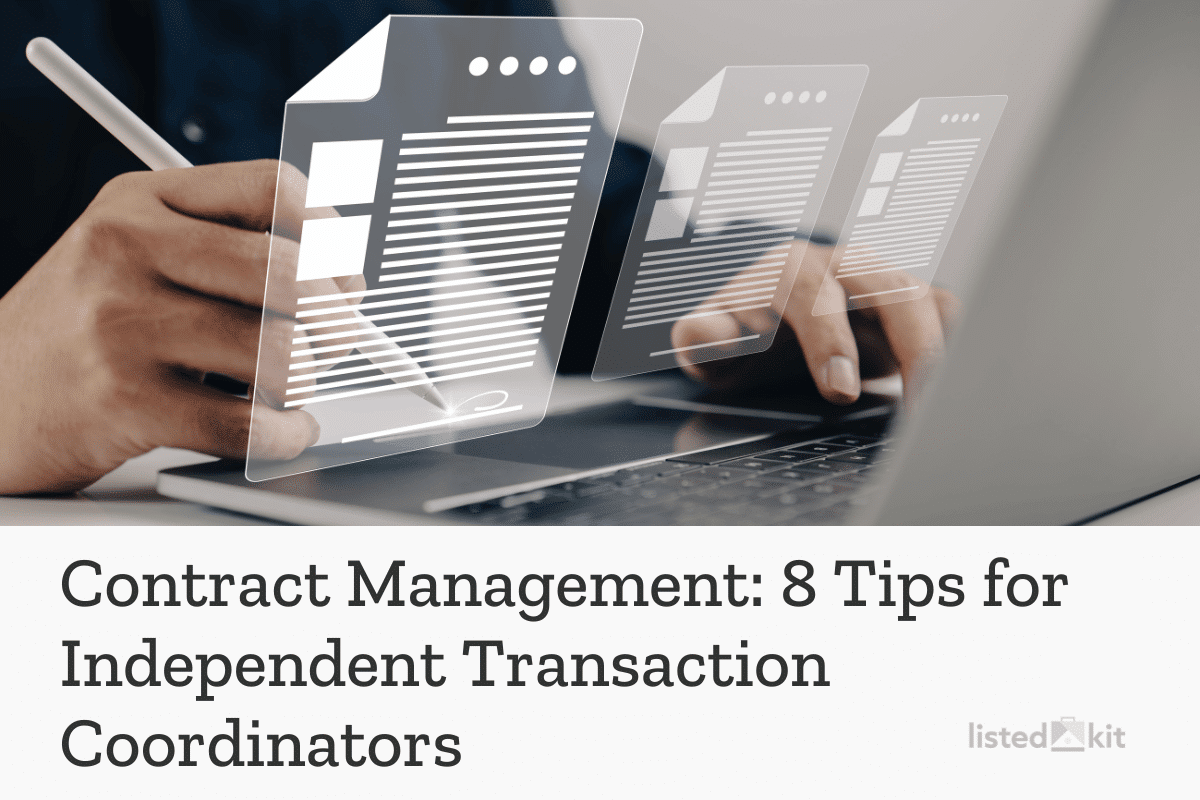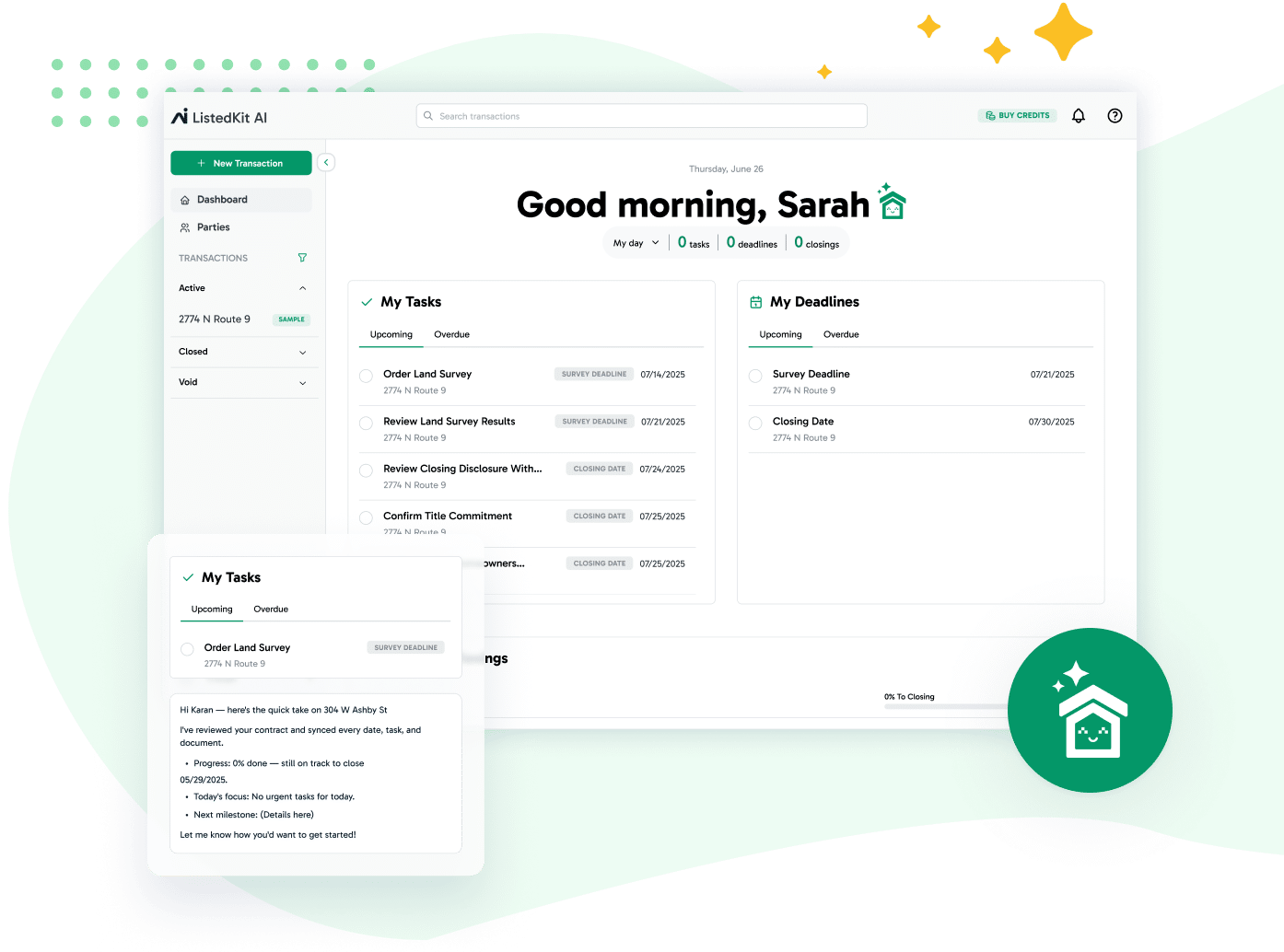Every real estate deal is built on contracts so learning how to manage them is essential to keeping everything on track. But with clients across multiple brokerages, each with its own system, it can get a little bit overwhelming.
So, how can you stay organized, meet deadlines, and communicate consistently during these times?
In this article, we’ll give you eight practical tips to help independent transaction coordinators navigate the chaos of real estate contract management. They will make your day-to-day work easier and more efficient and keep your clients happy.
1. Stay Organized With A Centralized System
Organization is the key to real estate agents and transaction coordinators. Keeping all contracts, tasks and deadlines in one place can be groundbreaking. It helps you keep all important details no matter what brokerage system you work with.
Using a centralized system also makes everything more efficient. Managing your client base, documents, and timelines becomes easier and more streamlined.
Consider using a project management tool or software. These systems often allow integration with other tools to manage multiple transactions simultaneously.
If you prefer a free option, Google Drive can work well. You can store all your files. You can also use Google Sheets to track tasks and deadlines and Google Docs to store contracts. That way, all information will always be accessible and shareable.
Choose a system that works for you. Whether you use paid software or a free option, being organized will make you more effective and keep your clients happy. It’ll also save you time and reduce errors, allowing you to close more deals.
2. Automate Repetitive Tasks
When managing real estate deals, tasks like sending reminders or updating clients can take up a lot of your time. Automation tools let you focus on high-level activities and less on tedious tasks. Here are some parts of your process that you can streamline.
Task Management
Task management involves organizing, scheduling, and tracking all the activities involved in a real estate transaction. Manually managing these tasks can be time-consuming and prone to errors, leading to missed deadlines and issues with clients.
But with tools like ListedKit, you can simplify this. This back-office solution lets you keep all your deals in one place – track tasks, deadlines, collaborations, and more.
You can also automate many parts of email communication management. Tools can send automatic client updates or reminders to agents about upcoming deadlines. So everyone’s informed without you having to send each email manually.
Document Storage and Sharing
In real estate, all documents need to be accessible. Automating document storage and sharing ensures everyone has what they need without delays.
Using cloud-based solutions like ListedKit’s integrated document management, real estate professionals can automatically store and share contracts, disclosures, and other important files securely with clients and agents.
Client Relationship Reminders
Automation can help you by setting reminders for important dates like contract renewals or anniversaries.
By automating these reminders, you’ll never miss a chance to touch base with your clients and stay at the top of your mind with them.
Payment and Billing Management
Automating payment and billing processes can save time and reduce errors. Tools that automatically generate invoices, track payments, and send reminders for outstanding balances help streamline financial management.
Benefits of Automation
- Saves agents time
- Reduces errors
- Provides a back-office solution for better organization
- Smooths transactions
Using automation for these tasks makes your job easier and the overall transaction more efficient.
3. Create Templates For Each Brokerage
Customizing templates for each brokerage is vital to being an independent real estate transaction coordinator. Different brokerages use different forms or have different steps in their process. Custom templates ensure your documents match real estate brokerages’ standards so you don’t go back and forth and waste time.
Template Library
Having a well-organized and up-to-date template library will help you manage contracts better and meet the needs of each brokerage. Here’s how to get started:
How to Build Your Library
- Gather Common Forms: Collect all the frequently used forms like purchase agreements, listing agreements and disclosure documents.
- Categorize by Brokerage: Create folders for each brokerage. Store templates specific to their requirements here.
- Standardized Naming: Name files clearly, like “ABC Brokerage Purchase Agreement”, so you can find them easily.
- Update Templates: Review and update templates regularly to ensure they are current with the latest regulations and brokerage standards.
Always check templates for consistency. Make sure all the required information is included for each brokerage.
4. Manage Deadlines With Task Management Tools
Task management tools help transaction coordinators track every task, deadline and milestone in the real estate process.
First, you have to set reminders and notifications. Tools like ListedKit give you a complete view of all your tasks so you can manage follow-ups, document submissions, and client communication in one place.
Actionable Steps for Task Management
- Weekly Review: Start your week by reviewing your task list to plan and prioritize your work.
- Daily Check-ins: Begin your day by looking at your daily tasks to stay on track and focused on what’s most important.
- Set Notifications: Use email or text alerts to remind you of critical deadlines and milestones so you don’t miss anything.
- Integrate Systems: Choose software that integrates with your calendar and email to centralize all information and keep your workflow streamlined.
Use these tools, and you’ll be organized and efficient as your volume grows. Workload and task management tools like ListedKit manage the process for you so you can focus on service and client satisfaction.
5. Establish Communication Protocols
You should practice and apply regular updates with agents, clients, and other stakeholders to your process. Everyone needs to be informed and on track.
The best way to do this is to set protocols from the start. Use ListedKit’s automated email features to schedule updates. Automated emails will keep agents and clients informed of deadlines and tasks.
For example, if you’re managing multiple closings simultaneously, automated emails can be set up to notify clients about upcoming inspection dates or remind agents of necessary document submissions. This ensures that everyone involved in the real estate transaction process is aware of what needs to happen next, reducing the chances of delays or miscommunication.
Consider setting up a table to organize your communication plan:
| Stakeholder | Frequency | Method |
|---|---|---|
| Agents | Weekly | Email, Slack |
| Clients | Bi-weekly | Email, Phone |
| Escrow Agents | As Needed | Email, Zoom |
Remember to also set expectations early. Let everyone know how often they will get updates and through what means. This will reduce confusion and keep everyone on the same page.
Besides contract management updates, communication is also important in the escrow process. Make sure escrow company agents are included in updates so they can manage their tasks. Clear communication channels will help resolve any issues that come up.
In summary, regular, organized communication will make your transactions more efficient and successful. Use the right tools and set clear protocols to keep everyone informed.
6. Use AI For Contract Review And Compliance
Artificial Intelligence (AI) is changing how you review contracts. You can now catch errors and comply with legal requirements more effectively. AI tools will scan and highlight key areas so nothing gets missed.
AI also reduces the time spent on manual reviews. For example, ListedKit’s AI contract reviewer can do tedious work like analyzing terms and conditions, verifying financials, and ensuring consistency in your contracts.
With AI-enabled estate transaction management software, you don’t have to manually go through each document to find the important clauses. AI will highlight and flag those sections, saving you time and effort.
Besides speed, AI is also more accurate. Manual reviews can miss small details. Meanwhile, AI checks every part of your contract with precision. So, it minimizes human error.
AI can also help with contract lifecycle management. It will help you keep track of contract milestones and deadlines and send reminders for renewals or other important dates.
By adding AI, you will make the process faster, more accurate, and compliant with legal standards. Thus, you can focus on other things, knowing your contracts are taken care of.
7. Brokerage Specific Requirements
Staying up to date on brokerage-specific requirements is key for independent transaction coordinators. Each brokerage will have its own procedures, documents, and compliance standards.
Get to know the unique systems and regulations of each brokerage. Check their websites, read any available materials, and communicate with their staff if needed. This will help you provide seamless service to your real estate teams and potential clients.
For a general view of important requirements, you can explore resources like the National Association of Realtors (NAR) Code of Ethics & Standards of Practice or attend webinars and training sessions offered by The Real Estate Educators Association (REEA). These platforms offer valuable insights and updates on industry standards and best practices, helping you stay informed and compliant.
How to Adapt Fast
- Checklist: Create a brokerage-specific checklist to ensure you don’t miss any steps.
- Templates: Set up templates for each brokerage. This will save you time and ensure consistency.
- Training: Attend any training sessions or webinars. These will provide you with useful information and updates.
- Software Mastery: Learn different real estate transaction management software.
8. Continuous Learning And Adaptation
Staying current in the fast-paced world of real estate contract management is key for independent transaction coordinators. Keeping up with new tools, regulations, and best practices will make you more effective and efficient.
Here are some reasons continuous improvement matters:
- New Tools: Technology changes fast. Keeping up with new software and tools will streamline your workflow and reduce errors.
- Regulations: Real estate laws and regulations change often. Staying informed will keep you compliant and avoid legal issues.
- Best Practices: Adapting to the latest best practices will improve your efficiency and the quality of your work.
Making time for regular learning and upskilling is key. Here’s how:
- Join the Real Estate Community: Participate in forums, attend conferences and network with other professionals to stay up to date with the latest trends and changes in the industry.
- Enroll in Training Programs: Consider investing in training programs or workshops. Courses on new software, real estate laws or advanced contract management techniques will be valuable.
- Set Learning Goals: Allocate specific time each week for learning. Make it a habit, whether reading industry journals, watching webinars, or taking online courses.
Actionable Steps
Here are some things that you can do right away to become a more effective and informed transaction coordinator:
- Update Your Knowledge Regularly: Subscribe to industry newsletters, blogs, and podcasts.
- Network: Connect with peers and mentors to share knowledge and experiences.
- Checklists and Templates: Use checklists from training modules to stay organized and not miss anything.
- Attend Webinars and Online Workshops: Regularly participating in online educational events can help you stay informed about the latest tools and techniques in real estate contract management.
- Read Industry Reports and Case Studies: Staying informed about the latest research and real-world examples in the real estate industry can offer new perspectives and strategies. This can help you refine your approach to contract management and stay competitive.
By making continuous learning a habit, you’ll be successful in the long term and stay ahead of the game.
Summary
You can speed up contract management by being organized, using automation, customizing templates, and using AI for contract reviews. Clear communication and adaptability will ensure smooth transactions and continuous learning will keep you ahead.
If you want to manage your contracts effectively for multiple brokerages, ListedKit can help. When opening an escrow, it will help you manage tasks and communication so you meet deadlines and stay consistent across all platforms.




